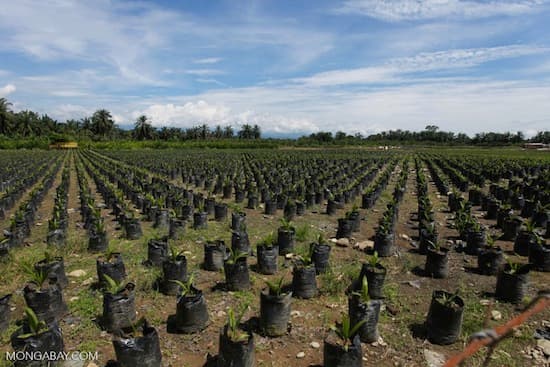Second largest palm oil producer in Indonesia commits to zero deforestation
Another major player in the Indonesian palm oil industry has adopted a zero deforestation policy; now it's time for the government of Indonesia [and Papua New Guinea] to catch up.
- Impacts of Astra Agro Lestari’s new sustainability commitments will be substantial once implemented.
- The company controls nearly 300,000 hectares of developed plantations.
- Experts say palm oil industry is now ahead of, and in some cases even held back by, official Indonesian policies

Photo: A future oil palm plantation in North Sumatra, Indonesia. Rhett Butler.
Mike Gaworecki | Mogabay
As Southeast Asia’s annual haze problem once again makes headlines, this time even leading to arrests of company officials allegedly connected to the illegal agricultural fires that create the smog, several major players in the palm oil industry have adopted zero deforestation policies and are working with the government of Indonesia to push for broader reforms.Now there’s an influential new member amongst their ranks.
Astra Agro Lestari (AAL), Indonesia’s second largest palm oil producer, announced a new policy today designed to protect forests, peatlands and local communities across its entire supply chain, including all of its subsidiaries and third-party suppliers as well as any plantation, refinery or mill the company invests in.
The policy states that AAL will “work closely with smallholders, non-governmentaI organizations (NGOs) and other stakeholders to drive positive change” before listing “No Deforestation,” “Conservation of Peatlands,” and “Respect for Human Rights” as the three principles on which the policy is based.
The direct impact of AAL’s new sustainability commitments will be substantial once implemented. The company has nearly 300,000 hectares (over 740,000 acres) of developed plantations and controls substantial undeveloped forests and peatlands as well, much of which are comprised of habitat for endangered elephants and orangutans.
The policy brings AAL in line with similar commitments that have been adopted by traders like Bunge, Cargill, Wilmar and Musim Mas and comes in response to calls from across all sectors of civil society for AAL to take responsibility for the impacts of its business operations.
Several groups working on the ground in Indonesia worked to amplify the voices of forest communities and indigenous peoples living with those impacts, including Yayasan Merah Putih, a community organization in Sulawesi.
“Astra’s policy represents a huge breakthrough. Even the Indonesian palm oil industry leaders who were previously most skeptical of conservation are calling on the government to launch a major push for forests and community rights,” Azmi Sirajuddin of Yayasan Merah Putih said in a statement. “At this point, the government really should have no excuse for inaction.”
Various environmental and conservation groups, including Forest Heroes and the Rainforest Foundation Norway, worked with investors and local communities to call on AAL to adopt strong forest and peatland commitments. Online advocacy oganization SumOfUs.org held protests outside Mandarin Oriental hotels, which are also by the Jardines Matheson conglomerate that owns AAL, to call on the company not to threaten Sumatran elephant habitat.
“We are very encouraged by Astra’s turn-around,” Anja Lillegraven of Rainforest Foundation Norway said in a statement. “We now expect the company to fully implement its ambitious policy on the ground to protect forests and peat, and ensure respect for forest-dependent communities’ human rights.”
Lillegraven said that while the AAL policy is big news in and of itself, it’s also important to note that the palm oil industry is now far more advanced than — and in some cases held back by — the Indonesian governance framework on palm oil.
But the addition of AAL to the ranks of companies that have pledged to go deforestation-free might be exactly what’s needed to spur the Indonesian government to action. AAL is a particularly important industry player, given that director Joko Supriyono serves as chair of the Indonesian palm oil producers’ association, and AAL’s parent company, Astra International, is Indonesia’s largest publicly traded company.
“Given where things were in the palm oil industry just a few years ago, it’s really exciting to see the key Indonesian palm oil producers join the race to forest conservation,” Glenn Hurowitz, Senior Fellow at the Center for International Policy, said in a statement.
